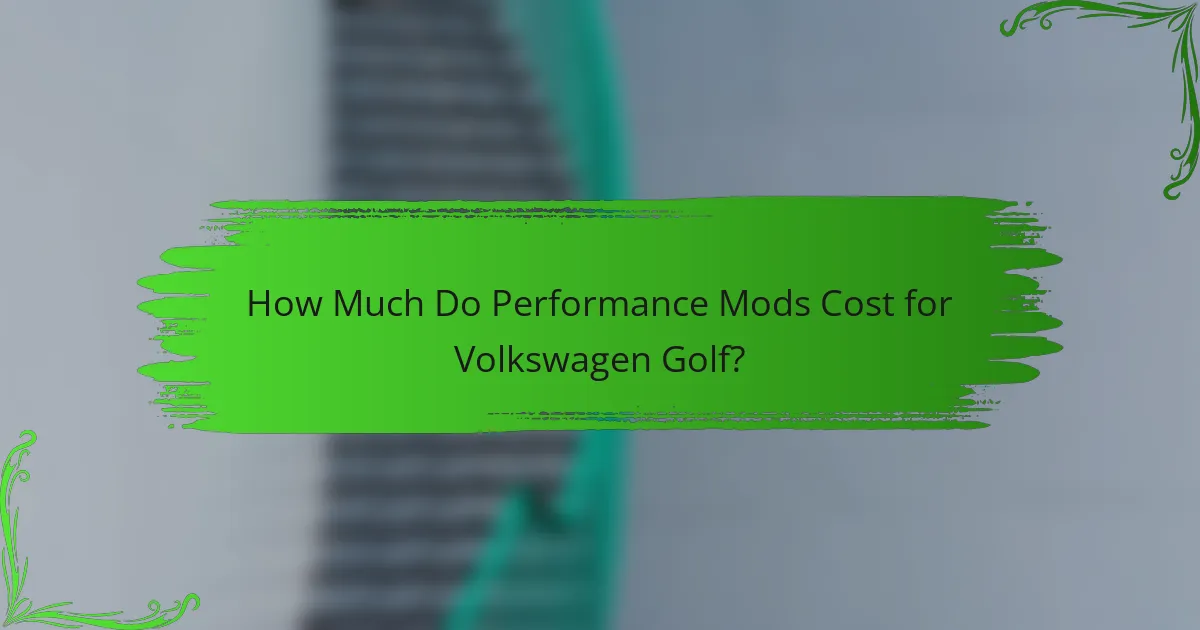Enhancing the performance of your Volkswagen Golf can be achieved through various modifications, including ECU tunes, cold air intakes, and exhaust upgrades. These performance mods not only improve power and efficiency but also cater to specific driving preferences. Costs can range significantly based on the type of modification and installation method, making it important to assess your budget and goals. Whether opting for DIY installation or professional help, understanding the complexities involved will ensure a successful upgrade.

What Are the Best Performance Mods for Volkswagen Golf?
The best performance mods for a Volkswagen Golf include ECU tunes, cold air intakes, exhaust system upgrades, turbocharger upgrades, and suspension kits. Each modification enhances specific aspects of performance, such as power, efficiency, and handling, making it essential to choose based on your driving goals.
ECU Tune
An ECU tune optimizes the engine’s performance by adjusting the software settings in the engine control unit. This modification can increase horsepower and torque significantly, often in the range of 10-30%. It’s crucial to choose a reputable tuner to ensure compatibility with your specific Golf model.
Installation is generally straightforward, requiring only a diagnostic tool and software. However, be aware that improper tuning can lead to engine issues, so always follow guidelines and consider professional assistance if unsure.
Cold Air Intake
A cold air intake system improves airflow to the engine, enhancing combustion efficiency and power output. This mod typically results in a horsepower increase of about 5-15%. Additionally, it can improve engine sound, giving your Golf a sportier tone.
Installation is usually a DIY-friendly process, taking around 1-2 hours. Ensure you select a high-quality intake that fits your model to avoid issues with water ingestion or engine management errors.
Exhaust System Upgrade
Upgrading the exhaust system reduces back pressure and enhances exhaust flow, which can lead to better performance and a more aggressive sound. Expect a power increase of approximately 5-20%, depending on the system chosen.
Consider options like cat-back systems for a balance of performance and sound. Installation can take a few hours and may require welding or cutting, so assess your skills before attempting it yourself.
Turbocharger Upgrade
A turbocharger upgrade significantly boosts engine power by forcing more air into the combustion chamber. This mod can elevate horsepower by 30% or more, depending on the turbo size and supporting modifications.
Installation is complex and typically requires professional help, as it involves modifying the exhaust and intake systems. Ensure you have supporting mods like an upgraded intercooler and fuel system to handle the increased power safely.
Suspension Kits
Suspension kits improve handling and ride quality by lowering the vehicle’s center of gravity and enhancing stability. Upgrading can lead to better cornering performance and a more responsive driving experience.
Choose between coilovers or lowering springs based on your preference for adjustability and ride comfort. Installation can be done at home with the right tools, but professional installation is recommended for optimal alignment and safety.

How Much Do Performance Mods Cost for Volkswagen Golf?
Performance modifications for a Volkswagen Golf can vary widely in cost, typically ranging from a few hundred to several thousand dollars, depending on the type and complexity of the mod. Factors such as brand, quality, and installation fees also play a significant role in the overall expense.
ECU Tune Pricing
ECU tuning, which optimizes the engine’s performance by adjusting the software parameters, generally costs between $300 and $800. This price can vary based on the tuning method—whether it’s a handheld programmer or a custom tune from a professional shop.
When considering an ECU tune, think about the potential gains in horsepower and torque, which can be significant. However, ensure that the tune is compatible with your vehicle’s specifications to avoid any issues.
Cold Air Intake Pricing
A cold air intake system typically ranges from $200 to $500, depending on the brand and design. This modification improves airflow to the engine, enhancing performance and efficiency.
Installation is usually straightforward, often taking less than an hour. However, be cautious of cheaper kits that may not fit well or provide the expected performance benefits.
Exhaust System Pricing
Upgrading to a performance exhaust system can cost between $400 and $1,200. This includes options like cat-back systems or headers, which can significantly improve exhaust flow and engine sound.
Consider the material quality, as stainless steel options tend to last longer and resist corrosion. Installation may require professional help, especially for more complex systems.
Turbocharger Pricing
Installing a turbocharger on a Volkswagen Golf can be one of the more expensive performance mods, typically costing between $1,500 and $4,000. This price includes the turbo unit, necessary components, and labor.
Turbocharging can dramatically increase power output, but it requires careful tuning and may necessitate additional upgrades like stronger internals or enhanced cooling systems. Always consult with a professional to ensure compatibility and reliability.

What Is the Installation Process for Performance Mods?
The installation process for performance mods on a Volkswagen Golf typically involves either DIY methods or professional assistance. Each approach has its own set of considerations regarding complexity, tools needed, and potential costs.
DIY Installation Steps
Installing performance mods yourself can be rewarding and cost-effective. Start by gathering the necessary tools, such as wrenches, screwdrivers, and possibly a jack for lifting the vehicle. Always refer to the specific mod’s manual for detailed instructions.
Common DIY mods include air intake systems, exhaust upgrades, and ECU tuning. Ensure you have a clean workspace and follow safety precautions to avoid injuries or damage to your vehicle.
Professional Installation Benefits
Opting for professional installation can save time and ensure that the mods are installed correctly. Professionals have the experience and specialized tools to handle complex modifications that may be challenging for DIY enthusiasts.
Additionally, professional installation often comes with warranties on both the work performed and the parts used, providing peace of mind. This can be particularly valuable for high-performance mods that require precise calibration.
Time Required for Installation
The time required for installation varies significantly based on the type of mod and the installation method. Simple upgrades, like air filters or exhaust tips, may take under an hour, while more complex installations, such as turbochargers, could take several hours or even a full day.
When planning for installation, consider potential delays due to unforeseen issues, especially with older vehicles. Setting aside extra time can help ensure a smoother process, whether you choose to do it yourself or hire a professional.

What Are the Compatibility Considerations for Mods?
Compatibility is crucial when considering performance modifications for your Volkswagen Golf. Ensuring that parts and upgrades fit your specific model and engine type will help avoid issues and maximize performance gains.
Model Year Compatibility
Different model years of the Volkswagen Golf may have varying specifications and design features. For example, modifications designed for the MK7 (2015-2019) may not fit the MK6 (2010-2014) due to changes in engine layout and electronic systems. Always check the compatibility of parts with your specific model year before purchasing.
Additionally, some aftermarket parts may be designed for a range of model years, but it’s essential to confirm that they meet the requirements of your particular vehicle. Using parts that are not compatible can lead to performance issues or even damage.
Engine Type Compatibility
The Volkswagen Golf comes with several engine options, including turbocharged and naturally aspirated variants. Performance mods that work well with a 2.0 TSI engine may not be suitable for a 1.8 TSI or a diesel engine. Always verify that the modifications are intended for your engine type to ensure optimal performance and reliability.
When selecting performance upgrades, consider how they interact with your engine’s specific characteristics, such as boost levels and fuel requirements. Some modifications may require additional tuning or adjustments to function correctly with different engine types.
Aftermarket Parts Compatibility
Aftermarket parts can vary significantly in quality and compatibility. When selecting these parts, look for reputable brands that specify compatibility with your Volkswagen Golf’s model year and engine type. Reading reviews and seeking recommendations can help you avoid low-quality components that may not fit properly or perform as expected.
It’s also wise to consider the warranty implications of using aftermarket parts. Some manufacturers may void warranties if modifications are made, so check your vehicle’s warranty terms before proceeding with significant upgrades.
